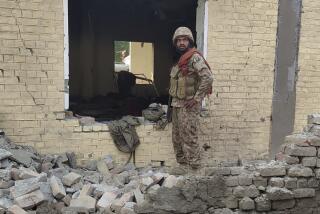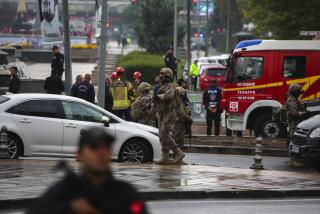Taliban says it blew up Kabul police bus
- Share via
KABUL, AFGHANISTAN — The Taliban claimed responsibility Sunday for the country’s worst bombing since the group was ousted from power more than five years ago, raising fears that militants are increasingly turning to tactics used to such deadly effect by insurgents in Iraq.
Thirty-five people, most of them police recruits, were killed when a massive explosion tore through a police academy bus in the capital during the Sunday morning rush hour. At least 35 people were injured.
The blast could be heard miles away and produced scenes of bloodshed more familiar in Baghdad than in Kabul.
Authorities were still trying to determine whether the bomb had been planted on the bus or whether it was a suicide attack. There were reports that the bomber may have jumped onto the bus as it stopped to pick up passengers at a busy station in central Kabul.
A coalition military spokesman said that joint forces carried out an airstrike late Sunday in Paktika province, killing “several militants” and seven civilians, possibly children at a madrasa, or religious school. The spokesman said they had intelligence that Al Qaeda fighters were hiding in a mosque compound that included the madrasa.
Since Friday, there have been at least four suicide attacks in different parts of the country, including one here Saturday.
The scale of Sunday’s bombing eclipsed anything Afghanistan had seen since U.S.-led forces overthrew the Taliban in December 2001. A car bombing in Kabul in September 2002 killed 30 people.
“It was a very, very successful suicide attack,” a Taliban commander, Mullah Hayatullah Khan, told Reuters news agency Sunday by satellite phone. “We have plans for more successful attacks in the future.”
The Islamist group’s claim of responsibility could not be independently verified Sunday. But such attacks increasingly have become a favored tactic of the Taliban, emulating Al Qaeda’s modus operandi in Iraq.
In March, top Taliban commander Mullah Dadullah warned in an interview with British TV that fighters were prepared to unleash a wave of suicide attacks on coalition troops.
Afghan government officials and institutions such as the police also are under heavy threat because the Taliban regards them as collaborators with illegitimate foreign occupiers.
“The suicide martyrs, those willing to blow themselves up, are countless,” declared Dadullah, who was killed in a U.S.-led operation last month in southern Afghanistan.
Within weeks of Dadullah’s statement, Afghan television began airing news reports of the arrests of suspected suicide bombers in Kabul and elsewhere.
Striking the capital in such spectacular fashion Sunday, a workday in Afghanistan, is likely to have a psychological as well as military impact. U.S. and North Atlantic Treaty Organization forces have worked hard to maintain Kabul as an oasis of relative calm, shielded from the conflict gripping other parts of the country, mainly the south and east, where militants have been most resurgent. Armored convoys routinely trundle through Kabul, and heavy security is often evident on the streets.
Last winter, coalition commanders had warned of an offensive by the Taliban during the spring thaw, a period that many analysts and officials said could determine whether Afghanistan stays on the path of reconstruction or lapses into widespread bloodshed.
Over the last few months, coalition forces have gone on the offensive in contested areas such as Helmand province, resulting in frequent clashes with Taliban fighters. Hundreds of insurgents have been reported killed, and some coalition and Afghan officials have been claiming success in preventing the expected military campaign.
Visiting Kabul two weeks ago, Defense Secretary Robert M. Gates sounded a note of guarded optimism, telling reporters that things were “slowly, cautiously headed in the right direction.”
But recent events suggest that the Taliban may be modifying its strategy, away from larger-scale battles to more pinpointed roadside bombings and suicide attacks of the kind that have stymied the U.S. in Iraq and chipped away support for the foreign troop presence.
In Kandahar province, the cradle of the Taliban movement, three coalition soldiers and an Afghan interpreter were killed in a roadside bombing Sunday.
Even northern Afghanistan, which is relatively quiet, has been affected. Last month, a suicide bomber struck at a market in Kunduz, killing three German soldiers and seven bystanders.
The bomb that exploded in Kabul about 8 a.m. Sunday ripped off the roof of the bus and left it a smoking ruin of twisted metal from which police pulled out body after body.
“Never in my life have I heard such a sound,” Ali Jawad, a vendor working near the scene of the blast, told the Associated Press. “A big fireball followed. I saw blood and a decapitated man thrown out of the bus.”
Training and equipping the Afghan police and army is a key element of the plan to shift responsibility for public security to homegrown forces so that foreign troops can eventually leave. But that has made Afghan security personnel a preferred target for the Taliban.
According to an AP count, as of Friday at least 307 Afghan police, army or intelligence personnel have died violently this year.
President Hamid Karzai, whose government is under pressure to restore law and order, denounced Sunday’s attack.
“The enemies of Afghanistan ... want to prevent Afghanistan from strengthening its national institutions and its national police and army,” he said.
Special correspondent Faiez reported from Kabul and Times staff writer Chu from New Delhi.
More to Read
Sign up for Essential California
The most important California stories and recommendations in your inbox every morning.
You may occasionally receive promotional content from the Los Angeles Times.














